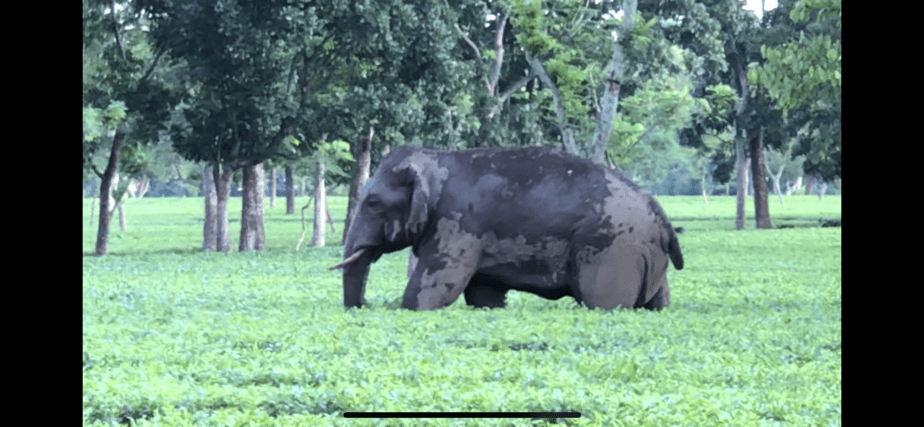
The Nuxalbari Tea Estate, nestled at the foothills of Eastern Himalayas, not far from Siliguri, is all geared up to be transformed into a functional ecosystem. About 100 acres of this estate has been dedicated to planting forest seeds, in order to support flora and fauna in the long run.
Sonia Jabbar, owner of the estate, wears many other hats, including being heavily involved in the groundwork of planting and crafting of tea. She inherited the estate, which has been in her family since 1884, and decided to put the land to uses other than commercial. She decided to create a biodiversity buffer on 100 acres of this land, which could slow down the rate of climate change and protect the Asian elephant that is endangered mainly due to habitat loss.
“I have been watching with horror how forests in our area are giving way to fields, and fields to factories and houses,” says Sonia. This made her realise the urgent need to counteract this by building a forest. And at the end of last year, she was able to put her plan in action. Prior to this, the estate was already home to a nursery with over 20,000 plants of 30 species, as well as a sanctuary for the Asian elephant.
At the end of 2017, Sonia approached filmmaker Pradip Krishen and ecologist Vijay Dhasmana for help, both of whom had taken significant steps in creating re-wilding projects. Although Sonia’s project was lacking funds, both Krishen and Dhasmana were interested in a venture in North Bengal. With their help, this year Sonia was able to conduct the fencing and planting of 2.5 acres of the 100 acres of land. “Next year we will have to raise funds to fence and plant at least five times the area, if we want to finish in the next 10 years,” she says. It’s a long road ahead.
As far as the elephant population is concerned, ever since elephants started being shot in Nepal, the creatures were not being allowed to migrate through the area. The locals would harass and tease the animals and drive them back into the forest. “We believe we have the license to chase and drive these elephants back into the cramped forest reserves that are left,” laments Sonia. Tragically enough, the chasing away was done by the Forest Department, with firecrackers and bombs, with the help of youngsters waving fire torches, bows and arrows, sticks, and stones.
Sonia’s security and staff has since been trained in crowd control to deal with such situations, and a 400m corridor has also been created to provide the elephants a safe passage . In addition to this, watering holes have been built for the elephants passing through, and growing grass and trees to serve as fodder is already underway. Besides this, The Nuxalbari Tea Estate is also attempting to reduce the human-elephant conflict by engaging with and helping the farmers who suffer when the elephants raid their crops.
Despite their first unpleasant scuffle with the Forest Department, the two parties have been able to arrive at a consensus, and are now working together to help the farmers. The Wildlife Trust of India has dubbed them the Green Corridor Champions of the area, and are even partnering with Sonia on certain projects. A programme for young volunteers to help with afforestation has also been successfully initiated. The planting and maintenance of one tree till its maturity would cost Rs 1,201, and many have donated for the cause. A model as simple as this one can be replicated in ecologically sensitive lands in many other areas. With efforts like these, a small but significant retardation of climate change can be achieved.
“Our planet is being destroyed very swiftly. We have no control over the rapacious effects of the so-called development over our natural resources,” she admits. But she goes on to say that we do have control over our own homes and immediate environment. And several small change could translate to bigger results, which is exactly what she hopes to accomplish with the biodiversity buffer in her tea estate. Finally, she adds, “Our hope is that other tea estates and coffee estates who have large parcels of land will understand our model and see that elephants are not inimical to their interests.”
Delhi hosted what organisers describe as the world’s first player auction in golf, launching ‘72…
An elderly woman recalls how her six-year-old granddaughter lay bleeding after a speeding car hit…
Municipal Corporation of Delhi plans a unified policy enabling RWAs to adopt and maintain parks…
A 17-year-old boy allegedly died by suicide after jumping before a moving train at Uttam…
Delhi High Court grants bail to 26-year-old Thar driver accused of mowing down two in…
Two Rohini men arrested for fatally stabbing one person and injuring another during a robbery…